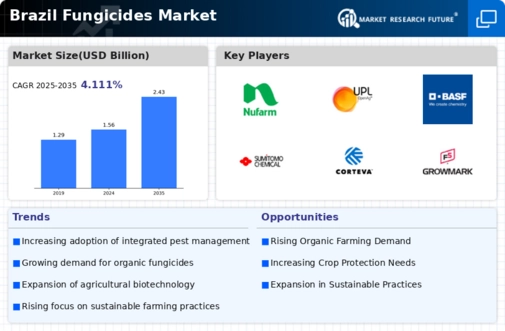Climate Change Impact
Climate change poses significant challenges to agriculture in Brazil, influencing the fungicides market. Variability in weather patterns, such as increased rainfall and temperature fluctuations, creates favorable conditions for fungal diseases. As a result, farmers are compelled to adopt fungicides to mitigate these risks. The Brazilian agricultural landscape is particularly vulnerable, with certain regions experiencing a rise in disease prevalence. In response, the fungicides market is expected to see a surge in demand for innovative solutions that can effectively combat these emerging threats. The adaptation strategies employed by farmers, including the use of resistant crop varieties and integrated pest management, may also drive the need for fungicides, ensuring sustainable agricultural practices.
Rising Agricultural Demand
The increasing demand for agricultural products in Brazil is a primary driver for the fungicides market. As the population grows, the need for food production intensifies, leading to a greater reliance on effective crop protection solutions. In 2025, Brazil's agricultural sector is projected to expand, with an estimated growth rate of 3.5% annually. This growth necessitates the use of fungicides to protect crops from diseases, thereby ensuring higher yields and quality. The fungicides market is likely to benefit from this trend, as farmers seek to maximize their output and profitability. Furthermore, the Brazilian government supports agricultural innovation, which may further stimulate the adoption of fungicides in various crops, including soybeans and corn.
Regulatory Changes and Compliance
The evolving regulatory landscape in Brazil significantly influences the fungicides market. Stricter regulations regarding pesticide usage and environmental safety are prompting manufacturers to innovate and comply with new standards. In 2025, it is expected that the Brazilian government will implement additional guidelines aimed at reducing chemical residues in food products. This shift may lead to increased demand for fungicides that meet these stringent requirements, thereby driving growth in the market. The fungicides market must adapt to these changes by investing in research and development to create safer and more effective products. As consumers become more aware of food safety issues, the demand for compliant fungicides is likely to rise, further shaping the market dynamics.
Technological Innovations in Agriculture
Technological advancements in agriculture are reshaping the fungicides market in Brazil. The integration of precision agriculture techniques, such as remote sensing and data analytics, allows farmers to apply fungicides more efficiently. This targeted approach not only reduces chemical usage but also enhances crop protection. In 2025, the adoption of smart farming technologies is anticipated to increase, with a projected market value of $1.2 billion in Brazil. Consequently, the fungicides market is likely to experience growth as farmers invest in advanced solutions that optimize their operations. Moreover, the development of new fungicide formulations, including slow-release and nano-encapsulated products, may further enhance efficacy and sustainability, appealing to environmentally conscious consumers.
Export Opportunities for Brazilian Agriculture
Brazil's position as a leading agricultural exporter presents substantial opportunities for the fungicides market. The country's diverse agricultural output, including soybeans, coffee, and sugarcane, necessitates effective crop protection measures to maintain quality and competitiveness in international markets. In 2025, Brazil is projected to export over $100 billion worth of agricultural products, underscoring the importance of fungicides in ensuring crop health. The fungicides market is poised to benefit from this export-driven demand, as farmers seek to enhance their product quality and meet global standards. Additionally, partnerships with international agricultural firms may facilitate the introduction of advanced fungicide technologies, further bolstering Brazil's agricultural exports and the fungicides market.





















Leave a Comment